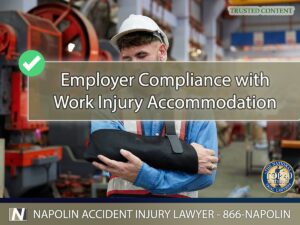Employer Compliance with Work Injury Accommodation Laws in Ontario, California
Workers' compensation laws in California are designed to protect employees who suffer injuries while performing their job duties. These laws ensure that injured workers receive the necessary medical care and financial support during their recovery period. Employers are legally required to accommodate work-related injuries when possible and reasonable, but understanding these obligations can be complex. This article aims to clarify the responsibilities of employers and provide guidance for injured workers in southern California.
An Introduction to Workers' Compensation in California
Workers' compensation is a state-mandated insurance program that provides benefits to employees who sustain work-related injuries or illnesses. In California, the program offers several benefits to injured workers, including medical treatment, temporary and permanent disability benefits, vocational rehabilitation services, and death benefits for dependents in case of a fatal injury.
These benefits are crucial for ensuring that injured workers receive the care and financial support they need without having to bear the burden of medical expenses and lost income. California law mandates that all employers carry workers' compensation insurance to cover these benefits.

Work Injury Accommodation Obligations Under California Law
Work Injury Accommodation Obligations Under California Law
Employers in California have a legal obligation under California Government Code 12940 to accommodate employees who have suffered work-related injuries. This means providing reasonable modifications or adjustments to the work environment that enable the injured employee to perform their job duties. Specific accommodations may include modified work schedules, light-duty assignments, ergonomic adjustments to workstations, provision of assistive devices, and temporary reassignments to different tasks.
Failure to provide these accommodations (without undue hardship) can result in legal consequences for employers, including fines and penalties. Employers must also avoid any form of retaliation against employees who file workers' compensation claims or request accommodations for their injuries. This falls under California Labor Code 132a.
Identifying Employer Work Injury Law Non-Compliance
It is important for injured workers to recognize the signs of employer non-compliance. Common indicators that an employer is not accommodating a work injury include refusal to modify job duties or schedules, ignoring medical restrictions provided by a healthcare professional, delaying or denying the provision of necessary equipment or adjustments, and disciplinary actions or threats against the injured employee.
When an employer fails to comply with their legal obligations, injured workers may feel helpless and uncertain about their rights. It is crucial to document any instances of non-compliance and seek legal advice to protect your rights.
Steps to Take if Your Employer is Non-Compliant
If you believe your employer is not accommodating your work injury, there are several steps you can take to address the situation:
- Communicate with your employer: Inform your employer of your medical condition and provide any necessary documentation from your healthcare provider. Clearly state your need for specific accommodations.
- Document everything: Keep a detailed record of all communications with your employer, including dates, times, and the content of conversations. Document any instances of non-compliance or retaliation.
- File a complaint: If your employer continues to refuse accommodations with no undue hardship, you can file a complaint with the California Civil Rights Department (CRD). The CRD can investigate your complaint and take appropriate action.
- Seek legal assistance: Consult with a workers' compensation attorney to understand your rights and explore your legal options. An attorney can help you navigate the complexities of the workers' compensation system and advocate on your behalf.
Taking these steps can help ensure that your rights are protected and that you receive the accommodations you are entitled to under California law.
The Role of a Workers' Compensation Lawyer
Navigating the workers' compensation system can be challenging, especially when dealing with an uncooperative employer. A workers' compensation lawyer can provide invaluable assistance by helping you understand your legal rights and obligations, assisting with filing claims and necessary paperwork, representing you in hearings and negotiations with your employer or insurance company, ensuring that you receive fair and adequate compensation for your injuries, and advocating for your rights in case of employer retaliation or non-compliance.
A knowledgeable attorney can make a significant difference in the outcome of your case, helping you achieve the best possible result while reducing the stress and uncertainty associated with the process.
Choosing the Right Workers' Compensation Lawyer
Selecting the right attorney to represent you in a workers' compensation case is crucial. Here are some factors to consider when choosing a lawyer:
Experience and Expertise
Ensure the lawyer has extensive experience in handling workers' compensation cases. An attorney with a deep understanding of California's workers' compensation laws and regulations will be better equipped to handle your case effectively.
Reputation and Reviews
Research the lawyer's reputation by reading client reviews and testimonials. Positive feedback from previous clients can provide insight into the lawyer's ability to handle cases successfully and their commitment to client satisfaction.
Communication and Availability
Choose a lawyer who communicates clearly and promptly. The attorney should be accessible and responsive to your questions and concerns throughout the legal process.
Legal Fees
Understand the lawyer's fee structure before committing. Many workers' compensation lawyers work on a contingency fee basis, meaning they only get paid if you win your case. Ensure you are comfortable with the terms of the fee agreement.

Common Challenges in California Workers' Compensation Cases
Common Challenges in California Workers' Compensation Cases
Workers' compensation cases can be complex and fraught with challenges. Some common issues that injured workers may face include denial of claims, delays in receiving benefits, and retaliation by employers.
Insurance companies may deny workers' compensation claims for various reasons, such as lack of evidence, pre-existing conditions, or claims of non-work-related injuries. It is essential to provide thorough documentation and medical evidence to support your claim. Delays in processing claims and receiving benefits can create financial hardship for injured workers. Working with a knowledgeable attorney can help expedite the process and ensure timely payment of benefits. Some employers may retaliate against workers who file compensation claims by reducing work hours, demoting, or even terminating their employment. California law prohibits such retaliation, and legal action can be taken against employers who engage in these practices.
Maximizing Your Workers' Compensation Benefits
- Report Your Injury Promptly: Notify your employer of your injury as soon as possible. Prompt reporting ensures that your claim is filed within the required timeframe and helps prevent delays in receiving benefits.
- Seek Immediate Medical Attention: Obtain medical treatment immediately after your injury. A prompt medical evaluation not only ensures your health and safety but also provides essential documentation for your workers' compensation claim.
- Follow Medical Advice: Adhere to the treatment plan prescribed by your healthcare provider. Following medical advice demonstrates your commitment to recovery and strengthens your workers' compensation claim.
- Maintain Detailed Records: Keep comprehensive records of all medical treatments, expenses, and communications related to your injury and workers' compensation claim. Detailed documentation can support your case and ensure you receive the benefits you deserve.

Employer Compliance with Work Injury Accommodation Laws in California
Employer Compliance with Work Injury Accommodation Laws in Ontario, California
Ensuring your employer complies with work injury accommodation laws is essential for your recovery and financial stability. If you are facing challenges with your workers' compensation claim, it is crucial to take the necessary steps to protect your rights and seek legal assistance.
At Napolin Accident Injury Lawyer, we have extensive litigation experience in workers' compensation cases. Our team is dedicated to helping injured workers navigate the complexities of the legal system and secure the benefits they deserve. If you need legal help, call us at (909) 962-8415 for a free consultation. Our experienced attorneys are here to advocate for your rights and ensure you receive the support and compensation you need during this challenging time. Don't wait—contact us today to take the first step toward securing your future.
